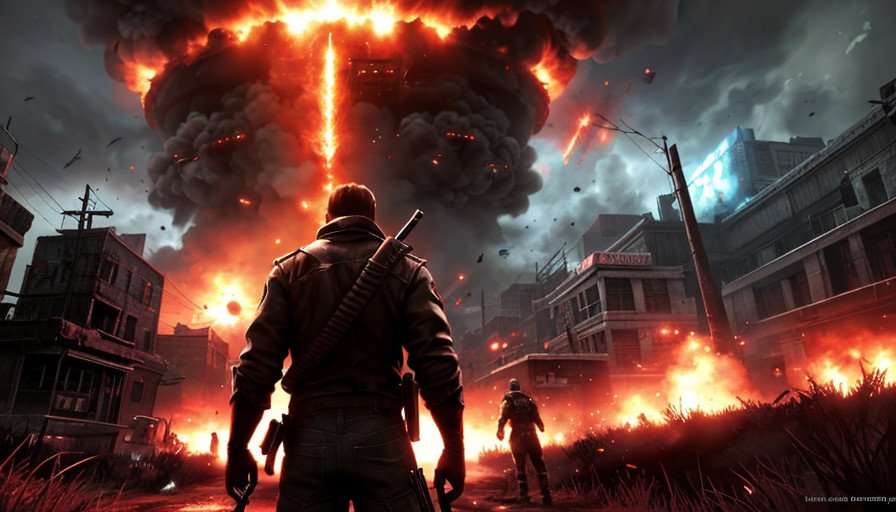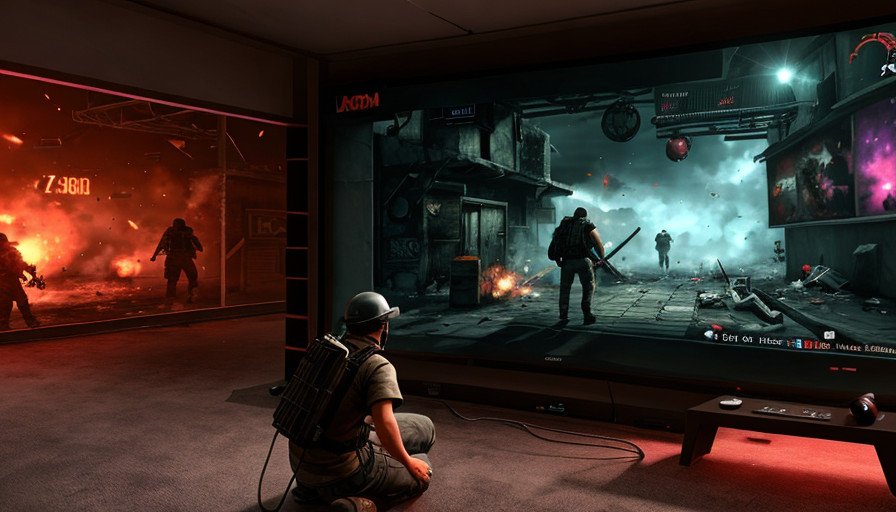The world of video games has undergone a significant transformation over the past few decades, with a particular focus on the rise of violent content. This shift has been paralleled by the emergence of livestreaming culture, where gamers can share their experiences and compete with each other in real-time. This article aims to explore the intersection of these two phenomena, examining the impact of video game violence on society and the role of livestreaming platforms in spreading this content.
The advent of violent video games and the rise of livestreaming platforms have led to a unique cultural phenomenon. As gamers share their experiences in real-time, the prevalence of violent content has increased, contributing to a culture where violence is not only accepted but also celebrated. This has significant implications for society, with research suggesting a potential link between exposure to violent video games and increased aggression.
Video Game Violence and its Connection to Livestreaming Culture
In this article, we will delve into the historical evolution of video game violence, from early games to the present, highlighting the technological advancements and the increasing realism of violent content. We will also explore the rise of livestreaming platforms such as Twitch and YouTube Live, and their impact on the gaming industry.
Furthermore, we will discuss the potential effects of violent video games on aggression, desensitization to violence, and the development of prosocial or antisocial behaviors. We will also consider the ethical considerations surrounding the creation and distribution of violent video games, as well as the responsibility of game developers, livestreamers, and platforms in managing and regulating violent content.
Finally, we will conclude the article by discussing potential future trends in video game violence and livestreaming culture, as well as offering recommendations for industry stakeholders, policymakers, and parents on how to navigate the complex landscape of video game violence and its connection to livestreaming culture.
The Rise of Video Game Violence
The advent of video games in the mid-2000s marked a significant shift in the gaming industry. The release of consoles like Sony’s PlayStation 3, Microsoft’s Xbox 360, and the Nintendo Wii brought about a revolution in gaming culture.

The Wii, despite using the least powerful processor and lacking high-definition graphics, was the most commercially successful due to its revolutionary movement-based controller and emphasis on short, multiplayer games. This shift in gaming culture led to a rise in violent video games, which became a major part of the gaming landscape.
The Connection to Livestreaming Culture
The rise of video game violence is closely linked to the emergence of livestreaming culture. Livestreaming platforms like Twitch and YouTube Live have become popular platforms for gamers to share their experiences and compete with each other.
The prevalence of violent video games has led to a rise in the livestreaming of these games, contributing to the normalization of violent content.
The Impact of Video Game Violence on Society
The impact of video game violence extends beyond the gaming community. Research has shown that violent video games can lead to increased aggression in players.
A study found that players of violent video games have a long-term impact on their social network, increasing their friends’ aggressive behavior. This suggests that violent video games can instigate an aggression cycle, leading to a rise in real-life aggression.
The Role of Livestreaming in Spreading Violence
Livestreaming platforms have played a significant role in spreading video game violence. By providing a platform for gamers to share their experiences, these platforms have normalized violent content, leading to a rise in violent video games. This has contributed to a culture where violence is not only accepted but also celebrated, further contributing to the rise in real-life aggression.
The Need for Regulation
Given the potential impact of video game violence on society, there is a need for regulation in the gaming industry. While research has shown that violent video games do not necessarily lead to real-life violence, it is important to monitor the trends and ensure that the gaming industry remains responsible and responsible.
This includes regulating the content that is available on livestreaming platforms and ensuring that it does not contribute to the normalization of violence.
The Evolution of Video Game Violence
Video game violence has evolved significantly since the inception of the gaming industry. The early games were simple, with minimal graphics and gameplay mechanics. The violence in these games was often exaggerated and cartoonish, serving more as a source of amusement than a reflection of real-world aggression.
However, as technology advanced, so did the realism of video game violence. Today, games feature realistic graphics, immersive gameplay, and violent content that is often disturbingly realistic.
This evolution has been driven by technological advancements and a shift in societal attitudes towards violence. Today, violence is more commonly portrayed in video games, leading to a rise in the prevalence of violent video games.
Livestreaming Culture and Its Influence
The rise of livestreaming platforms such as Twitch and YouTube Live has significantly impacted the gaming industry. These platforms have transformed the way people engage with video games, allowing gamers to share their experiences in real-time and compete with each other.

This shift in engagement has led to an increase in the consumption of violent video games, as players can now see and engage with violent content in a more immersive and interactive way.
Livestreaming has also influenced the portrayal of violence in video games, with many games featuring violent content to attract livestreamers. This has led to a culture where violence is not only accepted but also celebrated, further contributing to the rise in the prevalence of violent video games.
Psychological and Societal Implications
Research indicates that exposure to violent video games can have significant psychological and societal implications. One of the main effects is the potential for increased aggression in players. Studies have shown a significant positive correlation between exposure to violent video games and adolescent aggression.
This suggests that violent video games can make teenagers acquire, repeat, and reinforce aggression-related knowledge structures, including aggressive beliefs and attitudes, aggressive perceptual schemata, aggressive expectation schemata, aggressive behavior scripts, and aggression desensitization. Therefore, aggressive personality is promoted, increasing the possibility of aggressive behavior 6.
However, the effects of playing video games on well-being seem to depend largely on why and how an individual chooses to partake. Games can be good when you play for the right reasons. For example, video game practice can optimize executive control skills in dual-task and task-switching situations 2.
Ethical Considerations and Responsibility
The ethical considerations surrounding the creation and distribution of violent video games are numerous. The responsibility of game developers, livestreamers, and platforms in managing and regulating violent content is paramount.
The industry should be aware of the potential psychological and societal impacts of violent video games and take steps to mitigate these impacts. This includes regulating the content that is available on livestreaming platforms and ensuring that it does not contribute to the normalization of violence.
Moreover, parental guidance plays a crucial role in managing the exposure of children to violent video games. Parental monitoring is significantly correlated with reduced media violence exposure and a reduction in aggressive behavior 6 months later 6. Therefore, parental guidance and industry self-regulation are essential in managing and regulating violent content in video games.
In conclusion, while violent video games and livestreaming culture have significantly impacted the gaming industry, it is important to consider the potential psychological and societal implications. Ethical considerations and responsibility are paramount in managing and regulating violent content in video games.
The Intersection of Art and Entertainment
The debate over whether video game violence should be viewed as a form of artistic expression or as a potential societal harm is ongoing. Game developers argue that violent video games are a form of artistic expression, allowing them to explore complex narratives and themes. They also argue that these games can have positive social impacts, such as promoting empathy and understanding through the exploration of different perspectives and narratives.
On the other hand, gamers, scholars, and the general public often view violent video games as a potential societal harm. They argue that the realistic depiction of violence can desensitize players to real-world violence, leading to increased aggression and antisocial behavior.
This perspective is supported by research findings, which show a significant positive correlation between exposure to violent video games and aggression.
Future Trends and Recommendations
Looking ahead, it is likely that the prevalence of violent video games and livestreaming culture will continue to rise. This is due to the increasing realism of video games and the growing popularity of livestreaming platforms. However, this also presents new challenges and opportunities for the gaming industry, policymakers, and parents.
For industry stakeholders, it is crucial to continue exploring ways to balance the artistic expression and social impact of violent video games. This could involve developing more games that explore non-violent narratives and themes, or creating platforms that allow for the livestreaming of non-violent games.
For policymakers, it is important to continue monitoring the impact of violent video games on society and implementing regulations as necessary. This could involve regulating the content of livestreaming platforms, or implementing policies that promote the responsible consumption of violent video games.
For parents, it is important to continue monitoring their children’s video game consumption and ensuring that they are exposed to a variety of games, including both violent and non-violent games.
Parental monitoring has been shown to be significantly correlated with reduced media violence exposure and a reduction in aggressive behavior 6 months later 3. Therefore, parents play a crucial role in managing and regulating violent content in video games. You should read anothher article i wrote about >>>> Video Game Violence and the Gaming Industry to learn more.






